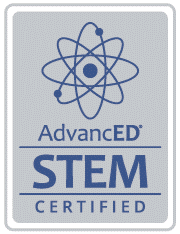The capstone of the first day of the 2018 AdvancED Missouri STEM Conference involved educators watching the film Most Likely to Succeed. This was followed by a panel discussion, then large group networking. However, we used PearDeck to encourage all the participants to write down their thoughts of the movie notes digitally while it was playing. The film provides timestamped discussion questions that were pushed out to the viewers via PearDeck. In this way, we were able to capture the collective conscience of the conference participants through guided questions that were thematically aligned with the movie. The results were pretty profound. Some key quotes that followed the guided questions can be seen below.
Educators are passionate about how schools can better serve students. Read what they have to say.
What’s not working for this student (and this system)?
Not engaged, not seeing the importance of what is being taught
Not authentic., no student voice, no ownership, no intrinsic motivation. no empowerment
School experience is disconnected from real world.
What is your reaction to High Tech High and student-centered instruction?
It’s the way things should be. But, getting there is a bit tricky as we “relearn” how to educate our students.
Student centered instruction should always be our fierce focus!
What are your thoughts surrounding assessment? Traditional, performance-based, authentic, and self- assessment.
Need performance based to tie to real life.
Assessments need to be authentic and directly tied to instruction… these should be designed before the unit is planned…knowing what we want kids to learn…then backwards design it.
Self assessment is number one highest impact strategy according to a Hattie’s work. This engages our learners to be an active part of their learning.
We can no longer educate our students to answer questions that can be looked up but rather educate them to answer questions that haven’t been asked yet.
Models of Instruction. Content vs. Skill. What are the implications for the future?
Content without skill is not useful. Skill with content drives us forward. Both are necessary. Content is at everyones fingertips, but you can’t access it, or can’t understand the content…then is it useful?
Content matters, but how you use it matters more.
Even though students have the answers to all of their content questions at their fingertips, we still have a responsibility to teach students how to distill and understand that content and then how to use that content to their advantage.
I recognize the importance of skill, yet content is also vital, whether it’s knowledge to be acquired or learned. You have to be able to discern information, its validity…who is responsible for the content we access?
What do you think about Test prep: Issues of accountability?
Testing shouldn’t be an event but a process of measuring student skills along the way of the learning journey. We need to assess often with checks for understanding so we can identify the minute or lesson we lose student understanding of the skill/ content.
Test prep can be great. But if it is just to regurgitate the knowledge a day of minutes later, it is poor. Students don’t remember it even a day later. Students are stuck on acing the test. Not learning.
I would happily get rid of any standardized tests because the main thing they test is one’s ability to do a test. Results on standardized tests are correlated with economic class because the tests are designed by people who live in suburban New Jersey (ETS is in Princeton) and who have been educated through a system that was built on the basis of versions of the standardized tests that they now develop.
This reminds me of the new Modern Learning White Paper entitled, “The War on Learning.”
The Three C’s: Career/College/Civic life VS. Creativity/Communication/Critical Thinking
The quote regarding kids begin as learning machines. They want to learn and grow and we [schools] grind that out of them. We teach them not to learn, but instead to memorize. Seriously Depressing. Makes me want to cry. Especially because I have 2 small children that both love to learn right now, and my husband and I both still love to learn, and one of my worst fears is them losing that love of learning.
Last line of a 1953 Poem written by Lida Hickman…
“So teacher please be careful with these students that you teach…for if they fail to learn to live, their hearts you’ve failed to reach.”
The parent’s perspective: Placing a Bet.
Context: When parents send their children to a school such as High Tech High, they are basically placing a bet on this model.
It makes me glad that I am not a parent.
It’s scary. I think for me, as a parent, using the “high tech high” strategy I think is maybe going to be great.
It’s quite scary… I just want to make sure that I am preparing my students in the right manner… I also want to make sure my own children are developing the skills to make them the most successful. I see that the traditional approach in the classroom doesn’t necessarily allow the students to be creative nor are they pushing their own limits.
It seems like the current bet on the traditional model of education isn’t a very wise bet for many of our students. I think the status quo is a riskier bet.
What is important about The Exhibition?
I love the persistence towards completion - grit…this is a real life skill because in life we all face challenge and we need to know how to push forward and not be a quitter when it gets tough. Kids need to be able to discuss their challenges along the way to completion and discuss how they problem solved through it.
Teamwork. This creates real life pressure and stress that is inevitably unavoidable in real life. This project create teamwork and real life things with consequences. The students really work for their achievements, nothing is handed to them. No one is giving the students their success, and no one is protecting them from failure.
Demonstration of learning in a way that connects with community. Definitely enhances the agency of students and teachers.
The displaying of work to an authentic audience gives students a higher level of accountability than an assessment for a teacher. Student motivation increases dramatically when a student is accountable to the community and an outside audience as opposed to a teacher or peers.
The students get to be creative…they get excited about showing off their own work. They are all under the pressure….allowing them to pull together and collaborate while feeling the pressure…which is similar to a real-world situation. It’s more than just telling people what they are doing…it is showing what has been done at school. The culture comes out and shines through…(good or bad). They see the “why”.
“A sense of purpose” What do we want schools to do?
Help students discover who they are, what they are passionate about, and help them move down a path toward success and happiness.
Produce self-learners that are confident and hungry to learn with a skill set that will prepare students to succeed at any task they are given. I like the analogy that education is more like gardening.
I want schools to provide students with a place of safety and comfort, where they find adults that are positive role models and care about them. Academically, I want schools to prepare students to succeed later in life. I want them to learn the basics of multiple paths, so that when they travel down one road then change their mind they can still go back and succeed elsewhere. I want them to know they can struggle and keep going and succeed. I want them to be productive members of society and not just problem finders but problem solvers. I want schools to enable students to be their best possible self and more.
Teach kids that struggle and failure are an inherent part of learning and growing. Critical thinking is a skill that is valued across disciplines. Collaboration is only learned through project based assignments. Accountability can take on many different forms but is still valuable and necessary. Confidence is another “c” that is critical and learned in this approach. Human capital is the key to success for businesses in the future!
Partner with parents to help students discover their strengths and interests. And to use their passions to help grow Empathy, Self-Control, Grit, Self-Determination, Happiness, and Self-Control.
Bonus Question:
What’s the most important thing in the film?
Relevance wins out for me every time.
Reflect on if I am teaching effectively and how I can do better
Times have changed and the way we educate needs to change, too.
Education needs to change in a way that is reflective of the world our students are growing up in.
Collaboration. Shell breaking.
We must move away from the industrial model of education to prepare our kids for the future.
Student engagement is key to better student outcomes.
Standardized tests are not the only way to assess our students’ amazing abilities. We have to allow them to “showcase” their abilities in different ways. Only when we do this will we truly be able to help our students grow and become the amazing individuals.
Students need new and different opportunities to show their learning. Soft skills are important to develop just like content knowledge.
Learning is a guided personal journey.
I like an environment of learning where students feel comfortable to be independent learners, where they can learn about things that interest them and can really work on those soft skills.
We need an education system that engages the whole child.
Learning must have a sense of purpose!
I think we can do both; continue to provide content-based learning alongside project-based.
Education is changing.




Comments